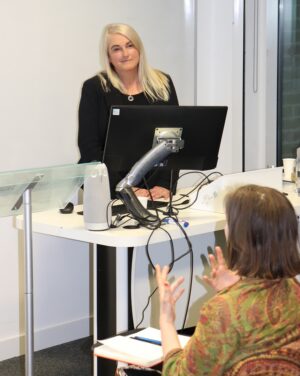 Cambridge University’s forum Contemplation: Theory / Practice heard last week evidence of the effectiveness of yoga and meditation in prison from The Prison Phoenix Trust Director Selina Sasse.
Cambridge University’s forum Contemplation: Theory / Practice heard last week evidence of the effectiveness of yoga and meditation in prison from The Prison Phoenix Trust Director Selina Sasse.
The forum, which is a network of the university’s Centre for Research in the Arts, Social Sciences and Humanities, brings together the ideas, history and application of contemplative traditions from around the globe, exploring a rich diversity of theories and practices united around a particular set of characteristics.
In her talk, Selina highlighted the theory, evidence and experience of the value of meditation and yoga for vulnerable people in prisons. This included how yoga improves physical and mental health, emotional resilience, self-esteem and a profound sense of connection and how neuroscience validates the experiential evidence from those The PPT supports.
The audience of academics from multi-disciplinary fields, including divinity, medieval English, criminal justice and neuroscience, along with prison chaplains, staff members and yoga teachers, also heard from former prisoner Paul:
“The first thing I learned when starting to meditate in prison was that you are never alone. When you do yoga and meditate, you are always part of a community of people all around the world.”
The theory and evidence presented drew upon the principles of trauma-informed yoga and how it empowers people in prison to have agency over their own experience.
Selina highlighted how neuroscience has shed light on the impact of meditation and yoga practice on brain development and nervous systems and how research in prison settings has shown this to improve positive mental states and reduce the negative states that lead to re-offending (Kerekes 2021) and increase ability to override impulse (Bilderbeck 2013).
She described how, in practice, how yoga enables people in prison to feel more responsible, focussed, less reactive, more relaxed and empathetic.
The audience heard from Michael how meditation helped connect his heart and mind so he was finally able to break the cycle of reoffending after 20 times in prison.
It also heard how The PPT’s mindfulness programme run with women at HMP Downview provided quantitative and qualitative evidence of the effectiveness of mindfulness, including how 81% of participants experienced an improvement in mental wellbeing measured ‘meaningful’ by psychologists.
The value of The PPT’s prison group classes for social engagement and cohesion was highlighted and how its guidance and encouragement of contemplative practice through letter writing, had helped numerous people over the charity’s 35+ year history. Richard told how this helped him get to know himself, ultimately changing the course of his life from high security prisons to living a settled life on release.
“We were honoured to be invited by Cambridge University to take part in the forum. It’s an important opportunity for a wider audience to learn about the present day value of contemplative practice in helping vulnerable people and creating safer communities.” Selina Sasse, The PPT Director
